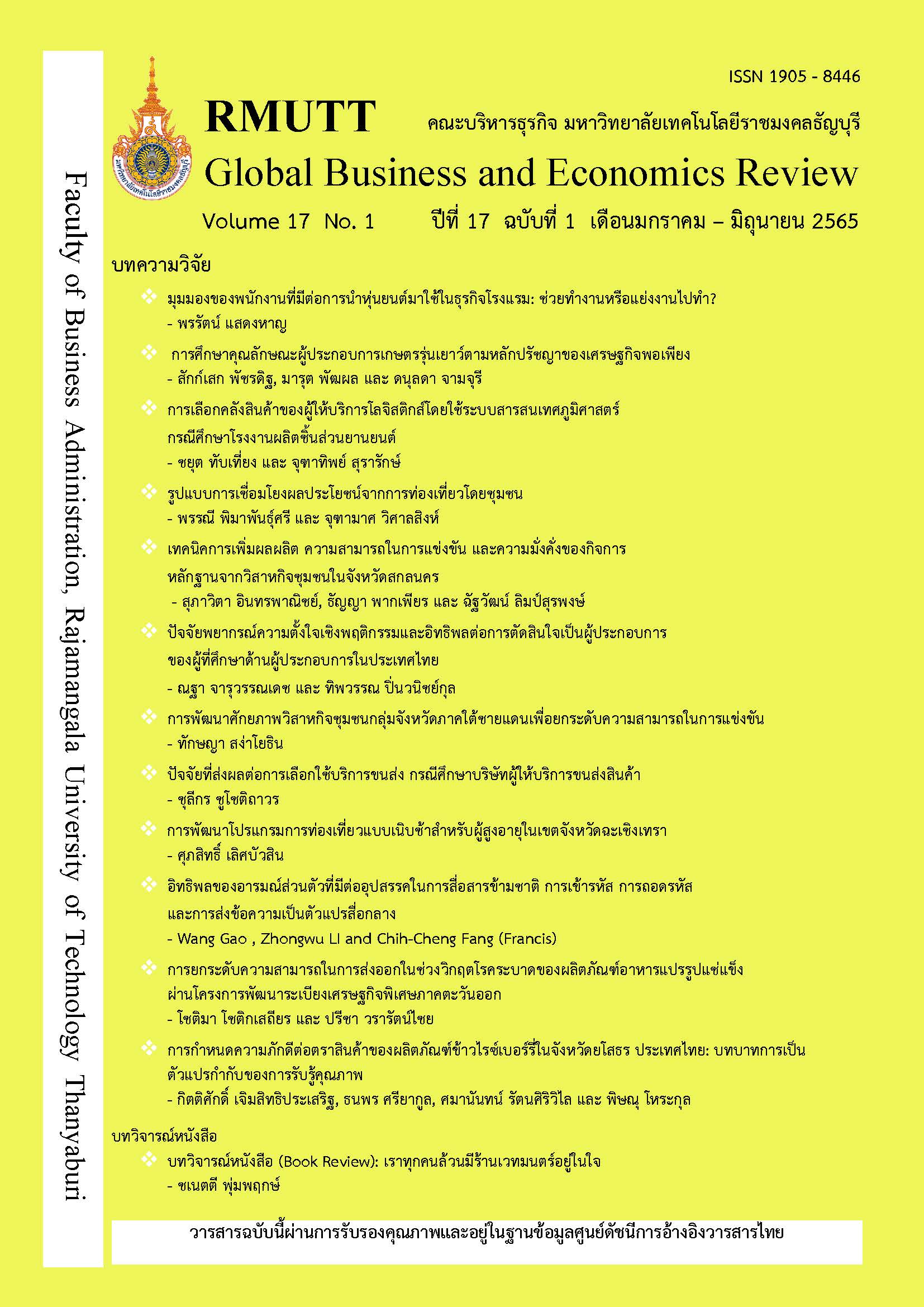DETERMINING THE BRAND LOYALTY OF RICEBERRY PRODUCT IN YASOTHON OF THAILAND: MODERATING ROLE OF PERCEIVED QUALITY
Keywords:
Brand Loyalty, Customer Satisfaction, Perceived Quality and Value, Perseveres, RiceberryAbstract
Brand loyalty is the positive feeling of the customer towards brand or product and customer repurchase and reuses it. In other words, it is called product addiction. Many related factors produce brand loyalty. The main aim of this study is to find out the different determinants of brand loyalty of Riceberry in Yasothon, Thailand with the moderation of perceived quality and value. Data is collected from the Rice industry in Yasothon, Thailand. Data is collected via the questionnaire by using e-mails of employees. The study is quantitative in nature and data is cross-sectional. After the collection of data, a statistical tool is applied to it. Results revealed that customer satisfaction, perceived quality, and value and preserves have a positive significant impact on brand loyalty of Riceberry. Moreover, perceived quality and value moderates the relation between customer satisfaction, preserves, and brand loyalty of Riceberry. This study suggested to managers of product companies of Riceberry that they have to focus on determinants like (customer satisfaction, perceived quality, and value and preserves) for increasing the brand loyalty of Riceberry.
References
Altaf, M., Hameed, W., Nadeem, S., & Arfan, S. (2019). Successful Entrepreneurial Process as Contributor towards Business Performance in Banking: Moderating Role of Passion for Inventing. South Asian Journal of Management Sciences, 13(1), 130-157.
An, S.-H. (2019). Employee Voluntary and Involuntary Turnover and Organizational Performance: Revisiting the Hypothesis from Classical Public Administration. International Public Management Journal, 22(3), 444-469.
Atkinson, H., & Brander Brown, J. (2001). Rethinking performance measures: assessing progress in UK hotels. International Journal of Contemporary Hospitality Management, 13(3), 128-136.
Banker, R. D., Konstans, C., & Mashruwala, R. (2000). A contextual study of links between employee satisfaction, employee turnover, customer satisfaction and financial performance. Texas: The University of Texas at Dallas.
Bufquin, D., DiPietro, R., Orlowski, M., & Partlow, C. (2017). The influence of restaurant co-workers’ perceived warmth and competence on employees’ turnover intentions: The mediating role of job attitudes. International Journal of Hospitality Management, 60, 13-22.
Gaspar, F. W., Wizner, K., Morrison, J., & Dewa, C. S. (2020). The influence of antidepressant and psychotherapy treatment adherence on future work leaves for patients with major depressive disorder. BMC psychiatry, 20(1), 1-10.
Hiranrithikorn, P., Jermsittiparsert, K., & Joemsittiprasert, W. (2019). The Importance of Conscious Idleness & Intellectual Entrench in Gauging Brand Loyalty toward Smartphone Brands. International Journal of Innovation, Creativity and Change, 8(8), 160-177.
Huber, H. F., Jenkins, S. L., Li, C., & Nathanielsz, P. W. (2020). Strength of nonhuman primate studies of developmental programming: review of sample sizes, challenges, and steps for future work. Journal of Developmental Origins of Health and Disease, 11(3), 297-306.
Jatiyananda, C., Nurittamont, W., & Phayaphrom, B. (2021). Understanding the Social Media Marketing Activities Influence on Revisit Intention in Beauty Clinics: The Case Study in Bangkok, Thailand. Asian Administration and Management Review, 4(2), 31-45.
Leecharoen, B. (2019). Examining the Relationships between Customer Satisfaction and Repurchase Behavior in Online Fashion Retailing. PSAKU International Journal of Interdisciplinary Research, 8(2), 123-136.
Melnick, H., Darling-Hammond, L., Leung, M., Yun, C., Schachner, A., Plasencia, S., & Ondrasek, N. (2020). Reopening schools in the context of COVID-19: Health and safety guidelines from other countries. California: Learning Policy Institute.
Nadeem, S., Alvi, A. K., & Iqbal, J. (2018). Performance Indicators of E-Logistic System with mediating role of Information and Communication Technology (ICT). Journal of Applied Economics & Business Research, 8(4), 217-228.
Sangperm, N., & Pungpho, K. (2020). Exploring the Nexus Between Bonding, Communication, Customer Satisfaction and Customer Loyalty: A Case of Higher Education Institutes in Thailand. Asian Administration and Management Review, 3(2), 25-38.
Seibt, B., Schubert, T. W., Zickfeld, J. H., & Fiske, A. P. (2017). Interpersonal closeness and morality predict feelings of being moved. Emotion, 17(3), 389.
Tallon, P. P., Queiroz, M., Coltman, T., & Sharma, R. (2019). Information technology and the search for organizational agility: A systematic review with future research possibilities. The Journal of Strategic Information Systems, 28(2), 218-237.
Tolstykh, T. O., Kretova, N. N., Logun, K. A., Popikov, A. A., & Kuznetsov, V. P. (2020). Directions and resource support of information and communication policy of hi-tech enterprises in the conditions of digitalization of the economy. In Growth Poles of the Global Economy: Emergence, Changes and Future Perspectives (pp. 1275-1285). Cham: Springer.
Wangchan, R., & Worapishet, T. (2019). Factors Influencing Customer Loyalty in Hotel Business: Case Study of Five-Star Hotels in Bangkok, Thailand. Asian Administration and Management Review, 2(1), 86-96.
Wessler, J., & Hansen, J. (2017). Temporal closeness promotes imitation of meaningful gestures in face-to-face communication. Journal of Nonverbal Behavior, 41(4), 415-431.
Yousefi, M., Ghalehaskar, S., Asghari, F. B., Ghaderpoury, A., Dehghani, M. H., Ghaderpoori, M., & Mohammadi, A. A. (2019). Distribution of fluoride contamination in drinking water resources and health risk assessment using geographic information system, northwest Iran. Regulatory Toxicology and Pharmacology, 107, 104408.
Downloads
Published
How to Cite
Issue
Section
License
Copyright (c) 2022 กิตติศักดิ์ เจิมสิทธิประเสริฐ, ธนพร ศรียากูล, ศมานันทน์ รัตนศิริวิไล, พิษณุ โหระกุล

This work is licensed under a Creative Commons Attribution-NonCommercial-NoDerivatives 4.0 International License.
The articles published in this journal are the intellectual property of their respective authors.
The views and opinions expressed in each article are solely those of the individual authors and do not reflect the positions of Rajamangala University of Technology Thanyaburi or any of its faculty members. All components and content of each article are the sole responsibility of the respective authors. In the event of any errors, the authors shall bear full responsibility for their own work.








